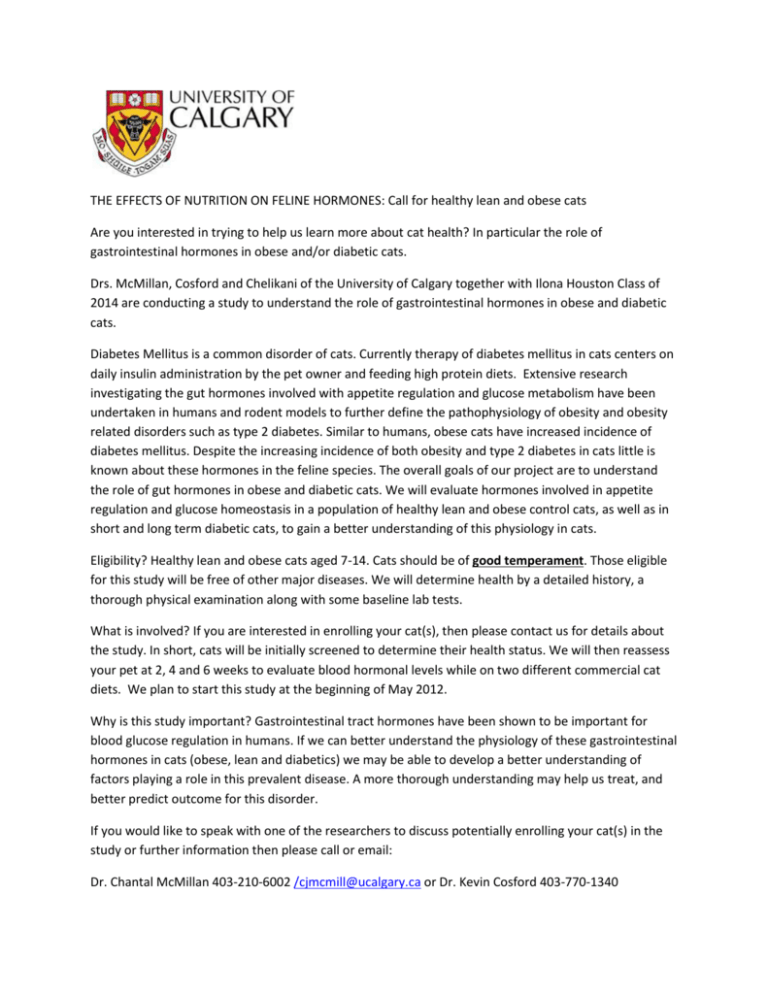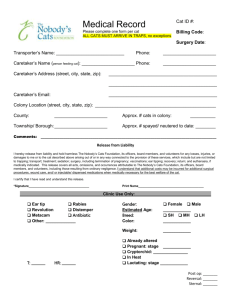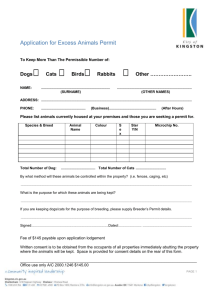THE EFFECTS OF NUTRITION ON FELINE HORMONES: Call for
advertisement

THE EFFECTS OF NUTRITION ON FELINE HORMONES: Call for healthy lean and obese cats Are you interested in trying to help us learn more about cat health? In particular the role of gastrointestinal hormones in obese and/or diabetic cats. Drs. McMillan, Cosford and Chelikani of the University of Calgary together with Ilona Houston Class of 2014 are conducting a study to understand the role of gastrointestinal hormones in obese and diabetic cats. Diabetes Mellitus is a common disorder of cats. Currently therapy of diabetes mellitus in cats centers on daily insulin administration by the pet owner and feeding high protein diets. Extensive research investigating the gut hormones involved with appetite regulation and glucose metabolism have been undertaken in humans and rodent models to further define the pathophysiology of obesity and obesity related disorders such as type 2 diabetes. Similar to humans, obese cats have increased incidence of diabetes mellitus. Despite the increasing incidence of both obesity and type 2 diabetes in cats little is known about these hormones in the feline species. The overall goals of our project are to understand the role of gut hormones in obese and diabetic cats. We will evaluate hormones involved in appetite regulation and glucose homeostasis in a population of healthy lean and obese control cats, as well as in short and long term diabetic cats, to gain a better understanding of this physiology in cats. Eligibility? Healthy lean and obese cats aged 7-14. Cats should be of good temperament. Those eligible for this study will be free of other major diseases. We will determine health by a detailed history, a thorough physical examination along with some baseline lab tests. What is involved? If you are interested in enrolling your cat(s), then please contact us for details about the study. In short, cats will be initially screened to determine their health status. We will then reassess your pet at 2, 4 and 6 weeks to evaluate blood hormonal levels while on two different commercial cat diets. We plan to start this study at the beginning of May 2012. Why is this study important? Gastrointestinal tract hormones have been shown to be important for blood glucose regulation in humans. If we can better understand the physiology of these gastrointestinal hormones in cats (obese, lean and diabetics) we may be able to develop a better understanding of factors playing a role in this prevalent disease. A more thorough understanding may help us treat, and better predict outcome for this disorder. If you would like to speak with one of the researchers to discuss potentially enrolling your cat(s) in the study or further information then please call or email: Dr. Chantal McMillan 403-210-6002 /cjmcmill@ucalgary.ca or Dr. Kevin Cosford 403-770-1340






